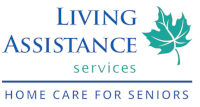The cost of home care services varies based on the degree of assistance needed. Many people are under the impression that receiving professional care at home is too costly and rely on family caregivers instead. Often times, family caregivers and the recipient come to realize that providing senior care, even very basic care, requires a considerable amount of time and often, out of pocket expenses. Then there is also the income lost if time needs to be taken off of work.
There Are Ways to Offset the Costs of Home Care Services
If you are currently contemplating elderly care for yourself or a loved one or are planning ahead for the future, the following are services and investments that can help offset the cost of in home health care. Utilizing government pensions, tax credits, and other government-funded programs can help make in home senior care services more affordable. Investing in an insurance policy, such as long-term care insurance or critical illness insurance can also help you cover the costs of in home health care if the need arises.
The following are some of the options available to help you pay for home care services, be it basic senior care or companionship, to more advanced home care due to chronic illness or disability.
Tax Credits
Depending on your annual income, you may be eligible for tax credits related to medical expenses, including prescription drugs, assistive devices and medical equipment, and modifications to your home or vehicle. Tax relief on electricity, transportation, and property taxes are also available. Together these credits can go a long way in helping you pay for home care services.
Available tax credits through the Government of Ontario include:
- Ontario Drug Benefit Program
- Trillium Drug Program
- Ontario Guaranteed Annual Income System (GAINS)
- Ontario Electricity Support Program
- Home and Vehicle Modification Program
- Provincial Land Tax Deferral Program for Low-Income Seniors and Low-Income Persons with Disabilities
- Ontario Senior Homeowners’ Property Tax Grant
- Ontario Seniors’ Public Transit Tax Credit
Pensions
Seniors living in Ontario can apply for pensions from the provincial and federal governments. It’s worth looking into the eligibility requirements for each as you may be eligible for more than you thought.
The different government pensions available include:
- Canada Pension
- Old Age Security pension
- Guaranteed Income Supplement
- Disability Pension
Veterans and their loved ones should also look into pensions and benefits for veterans available through:
- Veteran Affairs Canada
- Ontario’s Soldiers’ Aid Commission
- War Veterans Allowance
Insurance
If you’re planning ahead to your future, there are insurance policies, such as long-term care insurance and critical illness insurance that may help pay the costs of in home care services. Insurance can be expensive and premiums increase as you age. Speaking to a financial planner at your bank can be helpful in finding ways to afford paying your monthly premium if finances are tight.
Look into the different policies offered by different insurance providers, as they can vary greatly in cost and coverage.
Government-Funded Home Care and Community Services
Local Health Integration Networks (LHIN) handle all government-funded services for people living at home. This was formerly handled by Community Care Access Centres (CCAC). They can determine if you are eligible for home care services, such as personal care, homemaking, and other in home care, or family-managed home care, which provides you with direct funding to pay for home care services.
Contact your local LHIN for more information and eligibility.
Reverse mortgage
A reverse mortgage is a loan for senior homeowners that allows borrowers to access a portion of the equity in their home using the home as collateral. In general, the mortgage does not have to be repaid until the borrower permanently moves out of the property or passes away. This type of loan is a good source of revenue to assist with the cost of home care services.
How We Can Help
Living Assistance Services provides a broad range of in-home care services that can be adapted to give you or your loved one as much or as little assistance as needed on your schedule. Speak to us about our services and how they can be catered to suit your needs and budget.
David Porter, CPCA
Director
Living Assistance Services – Senior Home Care
Article Resources:
Seniors: manage your finances. https://www.ontario.ca/page/seniors-manage-your-finances
Tax credits and benefits for people. https://www.ontario.ca/page/tax-credits-and-benefits-people
Veterans Affairs Canada: After an illness or injury. https://www.veterans.gc.ca/eng/health-support/physical-health-and-wellness
Home and community care. https://www.ontario.ca/page/homecare-seniors#section-3

